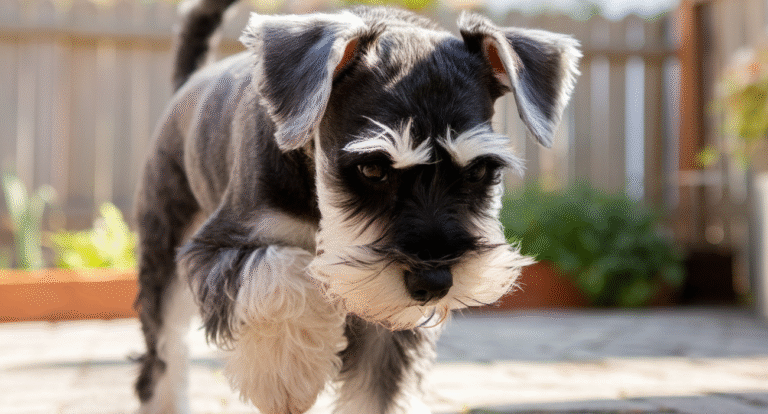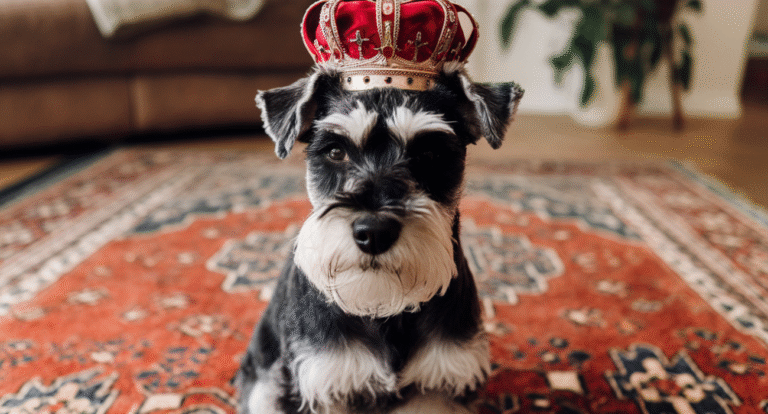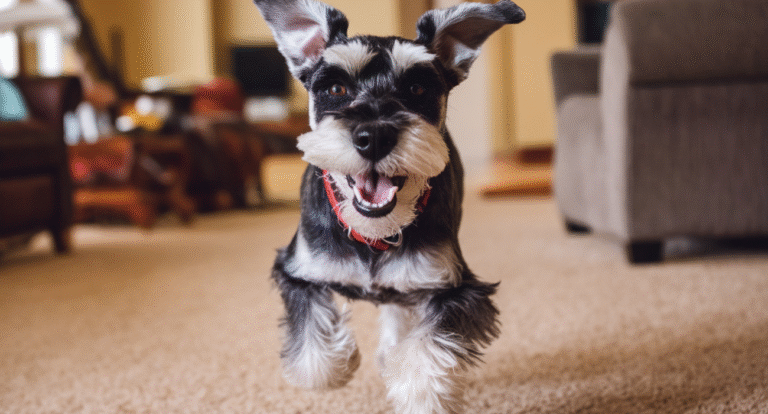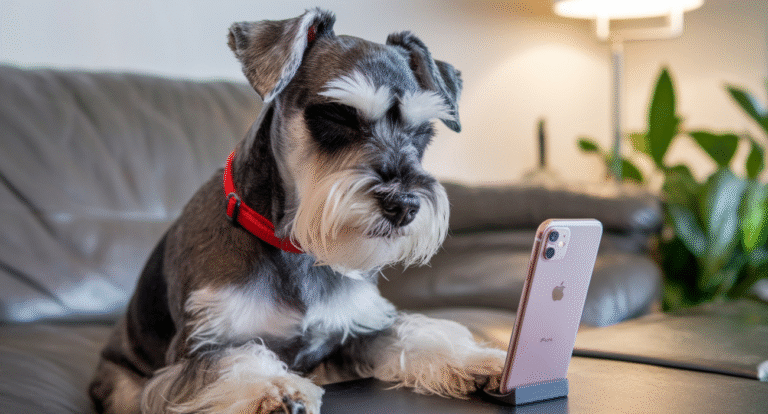Could your pup’s dinner be doing more harm than good? Watch for these 9 signs that it’s time to switch up their menu.
Your Miniature Schnauzer might not be able to speak, but they sure know how to drop hints. From itchy skin to sluggish zoomies, your pup’s body is constantly sending signals about what is going on inside. One of the most important clues you can pick up on is whether their current food is actually working for them. A poor diet or the wrong type of food can lead to discomfort, health issues, and a Schnauzer who just is not feeling like their usual lively self.
Here are nine clear signs that it might be time to rethink what is going into your Schnauzer’s bowl.
The Tell-Tale Signs Your Schnauzer’s Menu Needs a Makeover
1. Constant Itching or Skin Irritation
Picture this: your Schnauzer looks like they’re auditioning for a breakdancing competition, but they’re just trying to scratch an itch they can’t quite reach. Frequent scratching, licking, or red patches could be your pup’s way of saying their food isn’t agreeing with them. Miniature Schnauzers are notorious for having sensitive skin, and certain ingredients can turn their coat into an itchy nightmare.
Common culprits include beef, chicken, wheat, corn, and soy. If your furry friend is doing the “scratch and shake” dance more than usual, it might be time to explore hypoallergenic or limited-ingredient diets. These specially formulated foods can help identify and eliminate the troublemakers causing all that discomfort.
2. A Dull or Greasy Coat
Your Schnauzer’s signature beard and distinguished coat should be their crowning glory, not a greasy mess that looks like they’ve been working at a fast-food restaurant. When their fur starts looking flat, oily, or completely lifeless, it’s often a direct reflection of what’s happening nutritionally.
A healthy coat is like a mirror reflecting your dog’s internal health. When the shine disappears, it’s time to look deeper than just grooming habits.
Quality protein and essential fatty acids (especially omega-3 and omega-6) are the building blocks of a lustrous coat. If your current food is skimping on these nutrients or your Schnauzer isn’t absorbing them properly, their coat will be the first to wave the white flag.
3. Unexplained Weight Gain
Miniature Schnauzers have a talent for turning into adorable, walking footballs faster than you can say “treat time.” This breed is genetically predisposed to weight gain, making them the canine equivalent of that friend who gains five pounds just by looking at a donut.
If you notice your pup developing a rounder silhouette even though their exercise routine hasn’t changed, their current food might be too calorie-dense or loaded with unnecessary fats. Some commercial dog foods are surprisingly high in calories, and what seems like a normal portion could actually be a daily calorie bomb.
4. Trouble Maintaining Weight
On the flip side of the weight spectrum, some Schnauzers struggle to keep pounds on rather than off. If your pup looks like they’re auditioning for a canine version of a fashion runway (and not in a good way), poor nutrient absorption could be the culprit.
Low-quality ingredients, insufficient calories, or digestive issues can leave your Schnauzer unable to extract the nutrition they need from their food. It’s like trying to fuel a car with watered-down gasoline, it might run, but it won’t run well.
5. Digestive Upsets
Let’s talk about the less glamorous side of pet ownership: digestive drama. Frequent gas that could clear a room, diarrhea that turns walk time into a cleanup nightmare, or constipation that has your pup straining like they’re trying to move furniture, none of these are normal.
Your Schnauzer’s digestive system is essentially giving you a very clear (and smelly) review of their current diet. These symptoms often indicate food intolerances, poor-quality ingredients, or simply a food that doesn’t mesh well with your dog’s individual digestive needs.
| Digestive Issue | Possible Dietary Cause | Potential Solution |
|---|---|---|
| Excessive gas | High-fat content, certain grains | Switch to easily digestible proteins, reduce fat content |
| Diarrhea | Food allergies, rapid diet changes | Eliminate suspected allergens, transition foods gradually |
| Constipation | Low fiber, insufficient water intake | Increase fiber content, ensure adequate hydration |
6. Low Energy or Sluggishness
A lethargic Miniature Schnauzer is like a quiet toddler, something is definitely wrong. These dogs are naturally energetic, curious, and ready for adventure. When your normally bouncy companion suddenly prefers marathon napping sessions over their usual zoomies, their fuel source might be the problem.
Poor-quality proteins, inadequate calories, or blood sugar spikes and crashes from high-carb foods can leave your Schnauzer feeling like they’re running on empty. The right nutrition should provide steady, sustained energy that matches their naturally vibrant personality.
7. Excessive Shedding
All dogs shed, it’s basically their way of redecorating your home in fur. However, sudden or dramatically increased shedding often signals nutritional deficiencies. When your Schnauzer starts leaving enough hair around the house to knit a second dog, it’s time to examine their diet.
Protein deficiencies, lack of essential fatty acids, or poor overall nutrition can cause hair follicles to weaken and release more fur than normal. It’s your dog’s body prioritizing vital functions over maintaining a full coat.
8. Bad Breath That Will Not Quit
While no dog’s breath will ever be mistaken for a field of flowers, persistently offensive breath can be more than just a dental issue. Sometimes, chronic bad breath stems from digestive problems or food that’s causing oral inflammation.
When your dog’s breath consistently smells worse than a garbage truck on a hot summer day, their diet might be contributing to the problem.
Certain ingredients can promote bacterial growth in the mouth or cause digestive issues that manifest as particularly foul breath. While regular dental care is crucial for Schnauzers, addressing dietary contributors can make a significant difference.
9. Constant Hunger or Begging
If your Schnauzer acts like they haven’t eaten in weeks despite finishing their bowl five minutes ago, their current food might be failing the satisfaction test. Constant begging, scavenging, or seeming genuinely hungry shortly after meals often indicates their food isn’t nutrient-dense enough or isn’t providing sustained satiety.
Low-quality fillers, insufficient protein, or foods that cause rapid blood sugar fluctuations can leave your pup feeling perpetually unsatisfied. It’s like eating cotton candy for dinner, it fills the stomach temporarily but leaves you craving real nutrition.
Making the Switch: What to Consider
Before you completely overhaul your Schnauzer’s diet, remember that these dogs can have sensitive stomachs and unique dietary requirements. Sudden food changes can actually cause more digestive upset, so gradual transitions over 7-10 days are essential.
Consider factors like your dog’s age, activity level, any existing health conditions, and specific sensitivities. Senior Schnauzers might need different nutrition than puppies, and a couch potato will have different caloric needs than an agility champion.
The best diet isn’t necessarily the most expensive or trendy option, it’s the one that makes your individual dog thrive.
Your Schnauzer’s Path to Peak Performance
Your Miniature Schnauzer depends on you to decode these important signals their body is sending. Sometimes the solution is as simple as adjusting portion sizes, switching to a different protein source, or adding beneficial supplements to their current routine. Other times, a complete dietary overhaul might be necessary.
When in doubt, consult your veterinarian before making significant changes. They can help identify underlying health issues, recommend appropriate foods for your dog’s specific needs, and ensure any dietary transitions are safe and effective. With the right nutrition, your Schnauzer will return to their naturally vibrant, energetic self, complete with a shiny coat, comfortable digestion, and the boundless enthusiasm that makes this breed so beloved.






